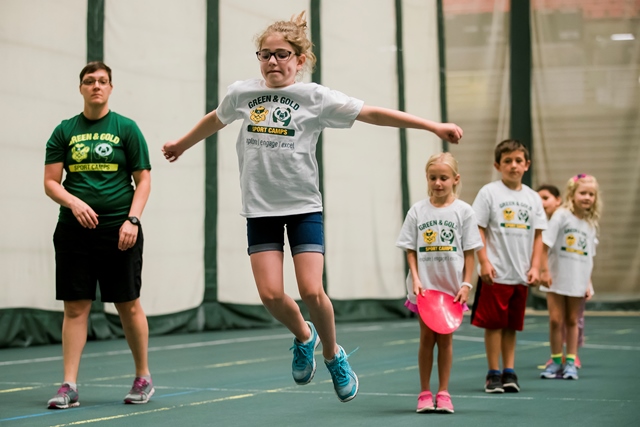
The Green & Gold Sport System at the University of Alberta hosts multi-sport camps for youth ages 6 to 11 throughout the summer months
Multi-sport athlete is a term that has been growing in popularity in mainstream media over the past several years. From Wayne Gretzky's "Message to parents" in the Globe and Mail to Steph Curry's "Approach to youth sports" in the Wall Street Journal, the message is very clear: encouraging your kids to participate in multiple sports from an early age will help develop a more well-rounded, confident and capable athlete.
"Putting your kids in different sports exposes them to a variety of movement scenarios. Swimming is very different than soccer, and soccer is very different than curling," said Nick Holt, University of Alberta sport psychologist who studies youth development. "By sampling different types of sport, youth are building a good foundation of movement skills, which will help them as an athlete and should keep them physically active later in life."
However, while parents are understanding the benefits of youth participation in multiple sports and activities, such as building a solid foundation of movement skills, some are taking it too far, which, according to Holt, can be just as detrimental as early specialization for the young athlete.
"The risks of over-scheduling are similar to specialization in that burnout and eventual drop-out are often the outcome," he said. "The added pressure of balancing a number of activities, especially as the kids age and responsibilities increase, can increase stress and anxiety levels in kids."
The solution to this swinging pendulum of variety is balance, which sounds simple enough, but is, according to Holt, often hidden in plain sight.
"Multi-sport camps, in particular, are ideal for helping to find that balance, especially for children ages 10 and younger," he said. "Kids are exposed to a sample of sport while gaining different movement experiences and sport skills and finding out what really interests them-what they really enjoy."
He added that because camps are often a short time commitment and take place throughout the summer months, the risk of over-scheduling your kids and increasing anxiety levels significantly decreases.
Last but not least, Holt also suggests that parents carve out time childhood rite of passage-free play.
"Free-play and family activities are just as important in developing confident, well-rounded individuals as sport participation. When all are taken into account, kids will benefit personally, socially and physically, and will set the stage for a physically active lifestyle."
To learn more about Positive Youth Development Through Sport, read a recent Q&A with Holt in the February issue of the Sport Parent Magazine-an evidence-based publication that is compiled and distributed by students in Holt's lab.
Find out what multi-sport camps are available through the University of Alberta's Green & Gold Summer Camps.